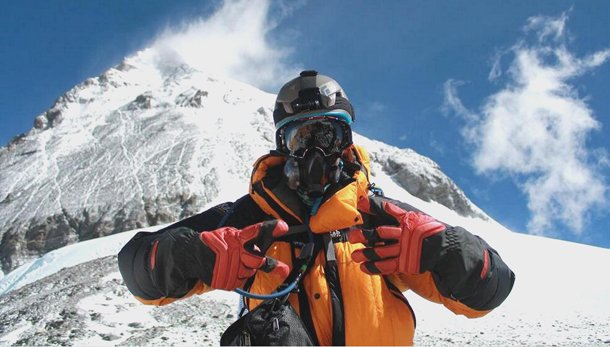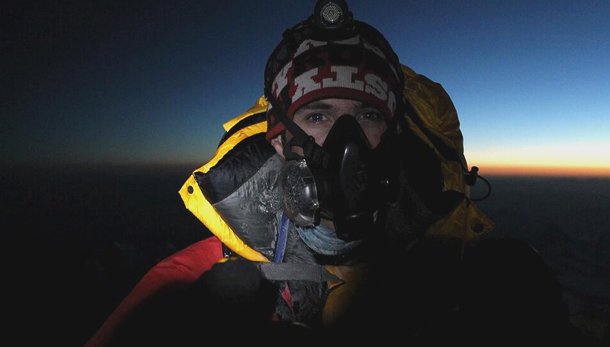Interview: Dean Hall on his next game, and when he'll stop working on DayZ

We learned during E3 that Dean “Rocket” Hall wants to make a game about mountaineering. The DayZ creator, who climbed Mount Everest in May, tells me it's a concept he's wanted to pursue for years, and one he somehow found time to iterate on while ascending Earth's hat.
In this conversation with Hall, I ask what he imagines his mountaineering game will be like and get him to consider the future of DayZ will look like without his direct involvement.
PCG: Tell me about your idea for a mountaineering game. The concept didn't originate while you were on Everest, right?
Dean Hall: No, I was actually at university. Since university. There's a game called Everest, a really shitty game, that I played a long time ago, and I was like, “God damn, why don't they just make this properly?” When I played that game I was like… I've always wanted to make this Everest game, so… I look at the Kerbal guys and I look at the Prison Architect guys and I'm like, “I want to make a game like that. A different game.”
"It's not an action game. It's more of a strategy game, because that's really where a lot of the challenges with climbing happen—the logistics and that kind of stuff."
Something people don't expect?
Hall: Yeah, something people don't expect. Something quite indie and fun and maybe do it in Unity or something like that, or maybe not. I don't know. There's still a lot of stuff to figure out with it. But yeah, that was something I was very interested in.
Do you have a sense of what kind of experience you want the player to have? Is it a single-player game? Is it a co-op game?
The biggest gaming news, reviews and hardware deals
Keep up to date with the most important stories and the best deals, as picked by the PC Gamer team.
Hall: I'm best noted for multiplayer, and I love cooperative and stuff like that. But I've also been really interested in other… I was talking about this with Patrice [Désilets], from Assassin's Creed, last night. And so… What I want to do is, I think this kind of game needs a single-player element. So I look at something like Dungeon Siege, which is great, where you can actually do stuff with your friends in multiplayer, even though you're mainly playing a single-player game. That was the kind of idea. A lot of the experience would be single-player, but players can maybe invite their friends to come in and help them. It's not an action game. It's more of a strategy game, because that's really where a lot of the challenges with climbing happen—the logistics and that kind of stuff. So I was looking at that. Then I thought it would be great to have online-only mountains, like Everest would be a classic one, where if you want to climb that, you have to compete with a bunch of other people for space and logistics and all that stuff.
I'm trying to see what that would look like. Do you see it as a first-person game, a third-person game…?
Hall: No, I don't. I see it as more of an isometric type of… Being able to go into first-person is good. But I definitely see it as, you have your avatar and you control him, but you're basically guiding some little AIs and stuff around, and your friends can come in and help you. Maybe you can challenge your friends to see who gets to the top first.
Do you see it as a simulation game?
Hall: No. A good model I would choose would be Kerbal Space Program. I love Kerbal Space. I talk about it all the time. I probably talk about it more than DayZ at this point. I saw what those guys were doing and I was like, “I want to do a project like that.” Also, I thought it would be interesting to do a non-shooter game. I've been involved with that for a long time now. I really wanted to look at that.
Right, I remember hearing you tell someone from Riot last night that you don't particularly like shooters.
Hall: Yeah. I'm not good at them. I'm not good at Counter-Strike. It's just not me. Arma obviously, as you know, provides this whole other dimension, which means I can do it, but… I'm really interested in the strategy stuff. If you look at the games that I play, there's a lot of elements of that in there. I like the mountaineering idea because I don't think anyone's done anything quite like that before. It's a nice mix of the things I'm interested in.

Obviously climbing Everest takes more than an hour or a couple of hours. Do you think that you'd create save points? Would it be a multi-day campaign? Would there be accelerated time?
Hall: I think the idea is to have different mountains providing different challenges. The idea was to try and perfect a quick experience on a smaller mountain, but I think definitely scaling comes into effect. The idea is to try to compress the experience down a little bit and take the approach that Kerbal did. Kerbal went in one direction, but very slowly, leaning quite a lot on the base of what the community feedback was. I want to follow that model —come up with this design, try it out on something quite simple, and see if maybe it'll steer in the direction of being more of a simulation or not. Maybe it'll steer more in the direction of being a more, dare I say it, arcade type of experience that's in a much shorter time frame. I still think it's going to have quite strong elements of strategy and survival in it. It's kind of like DayZ, but a level up. Not in an apocalypse scenario. It's survival, but it's survival strategy.
"I love Kerbal Space. I saw what those guys were doing and I was like, 'I want to do a project like that.'"
Has Marek [Spanel, Bohemia Interactive CEO], for example, given you free rein to just pursue that idea?
Hall: Well, I'm not… I'm only signed with Bohemia for DayZ, so I'd need to come up with something else. I haven't even thought about who to do it with yet. I'm not sure how to work in the Real Virtuality engine. My ultimate aim is, I want to create my own studio that I can run under my own ethos. I love working with Marek, so I think I'll always have a close relationship with them, but I think, to make this game, I'd want to find people to do it with who… There's been a few people I've met here who've said, “Wow, I've always wanted to do this mountaineering game.” I'm trying to assemble people who really want to do that.
I know it's hard to predict, but how long do you see yourself working on DayZ?
Hall: I think right now, realistically, the next 12 months. Particularly if a console port came in—or ports, if there were changes to certain consoles. I'd say I'm probably being realistic there, to deal with that.
What do you consider the biggest remaining challenges on getting the standalone version of DayZ done and releasing it in a playable state?
Hall: I think the zombies. Because it's a zombie game, a lot of people have an expectation that they need to be very good. I've seen that on Reddit and forums and posts last night. We've got a bit of work to do there. I think that's really about it now. We're at a point where we can push play any day now. We just want to make sure that when we push play, we're not screwing things over. The model in my heart that I'm choosing is how the Introversion guys did Prison Architect. We're not going to follow their pricing structure, because they tried to—and I don't know if they succeeded—price people out of the alpha. They said, “We know that hardcore fans will buy the game. We don't want people to buy the game now who won't like it.” But when I first played it I was like, “Wow. It's pretty bare. There's not much there.” But I knew there was the husk of an awesome game there.
I don't know if you've played the recent build, like alpha 10 . It's so much freaking fun there. It was a lot of fun. So that's what I think we want to do. We want to release this very bare-bones alpha. We'll try to discourage people from buying it. The less people buy it, the better for the alpha. We'll have a really good core group of people who want to be part of the development, who want to be part of it from the start. I don't think it's going to take long, like weeks and months, before we start to see some progress. More people will come in. The energy gets better. Then we get towards a beta and I think from there it will be smooth.
One of the other things you were talking about last night was this notion of trying to make the player's body and the environment more of an enemy or a threat. Can you talk about how you're implementing that?
Hall: Yeah. You played Space Station 13 , right? Basically I looked at Space Station 13 and I said, “I want that, I want that, I want that.” You notice that there's no UI and you get little text indicators, just like Space Station 13. I'm meeting the Space Station 13 guy at Rezzed, so I'm going to kidnap him or something. Lock him in my suitcase and take him back. The idea is the immersion, to try and put the player in there. Not give the player so many obvious cues. To make them really be thinking about how their body is. You run along without shoes for a while, your feet hurt, your feet are getting sore. After a while of doing that even longer, you get a stress fracture and you end up limping around everywhere. So the idea is really to make items quite important. Even though you might be abandoned, you might have no shoes. You need shoes. There's your story… You could go out and shoot someone or whatever, but you might damage items and all that. I think there are so many new items coming in. With a level of, I guess… There's a lot of complexity, but I'm hoping the complexity is fairly intuitive. It's stuff people understand. You run a lot, your shoes are going to degrade. That kind of stuff. There will be more encouragement to interact. It's not necessarily positive interaction. A lot of it might be neutral or even negative, but at least we're pushing people to interact.
Thanks, Dean.

Evan's a hardcore FPS enthusiast who joined PC Gamer in 2008. After an era spent publishing reviews, news, and cover features, he now oversees editorial operations for PC Gamer worldwide, including setting policy, training, and editing stories written by the wider team. His most-played FPSes are CS:GO, Team Fortress 2, Team Fortress Classic, Rainbow Six Siege, and Arma 2. His first multiplayer FPS was Quake 2, played on serial LAN in his uncle's basement, the ideal conditions for instilling a lifelong fondness for fragging. Evan also leads production of the PC Gaming Show, the annual E3 showcase event dedicated to PC gaming.

